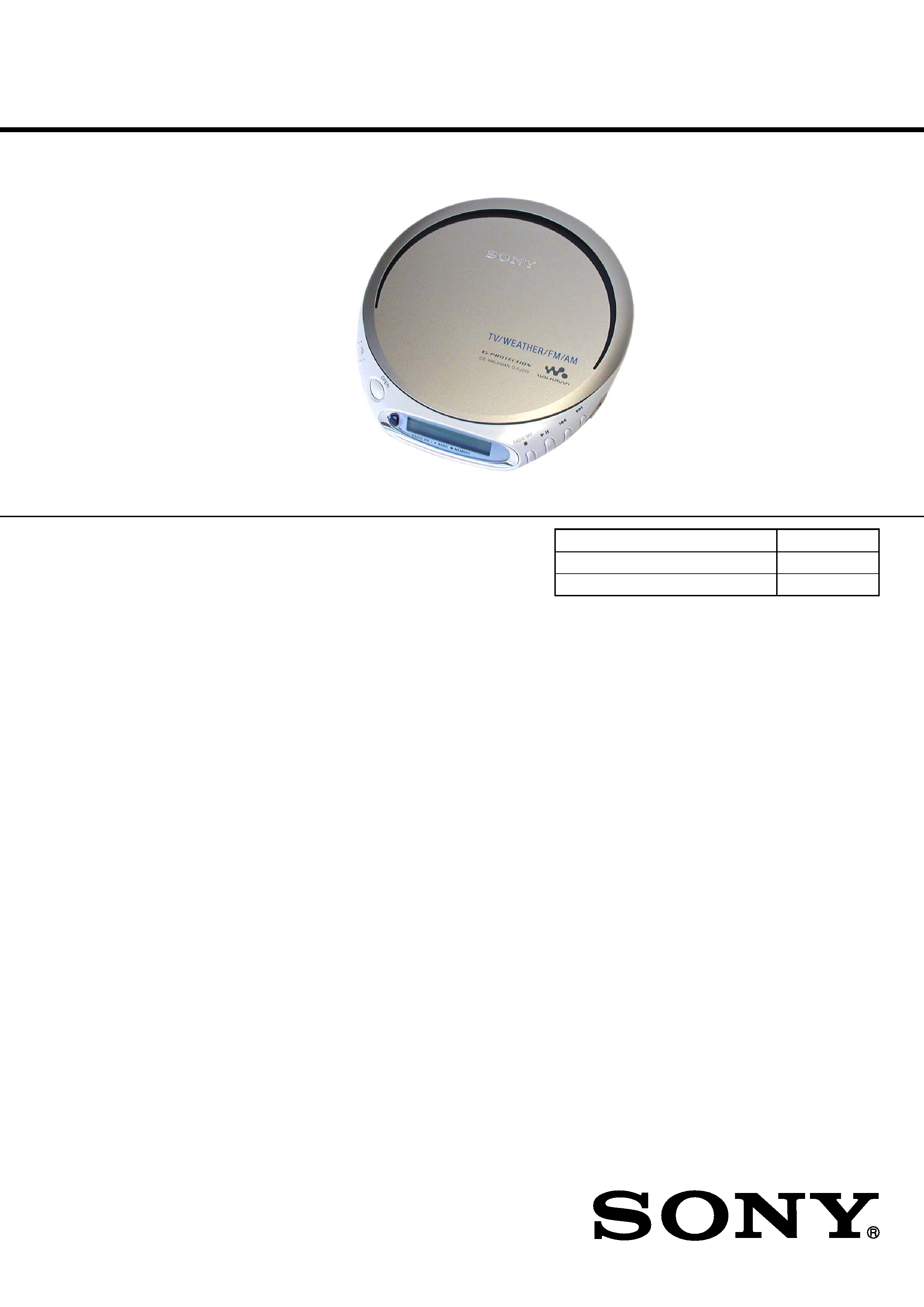
D-FJ210/FJ215
Photo : D-FJ210
Model Name Using Similar Mechanism
D-EJ360
CD Mechanism Type
CDM-3325ER
Optical Pick-up Type
DAX-25E
Ver 1.0 2003.02
9-877-064-01
2003B0200-1
© 2003.02
Sony Corporation
Personal Audio Company
Pubulished by Sony Engineering Corporation
TV/WB/FM/AM PORTABLE CD PLAYER D-FJ210
FM/AM PORTABLE CD PLAYER D-FJ215
SPECIFICATIONS
System
Compact disc digital audio system
Laser diode properties
Material: GaAlAs
Wavelength:
= 780 nm
Emission duration: Continuous
Laser output: Less than 44.6
µW (This output is the value measured at a
distance of 200 mm from the objective lens surface on the optical pick-up
block with 7 mm aperture.)
D-FJ210 :
Frequency range (10k/9k switch)
10 kHz step:
TV: 2 - 13 ch
WB (weather band): 1 - 7 ch
FM: 87.5 - 108.0 MHz
AM: 530 - 1710 kHz
9 kHz step:
TV: 2 - 13 ch
WB (weather band): 1 - 7 ch
FM: 87.5 - 108.0 MHz
AM: 531 - 1710 kHz
D-FJ215 :
Frequency range (Chinese model)
FM: 87.5 - 108.0 MHz
AM: 531 - 1602 kHz
Frequency range (10k/9k switch) (except Chinese model)
·9 kHz step:
FM: 87.5 - 108.0 MHz
AM: 531 - 1 602 kHz
· 10 kHz step:
FM: 87.5 - 108.0 MHz
AM: 530 - 1 710 kHz
US Model
D-FJ210
E Model
Australian Model
Chinese Model
D-FJ215
Power requirements
For the area code of the model you purchased, check the upper left side of
the bar code on the package.
·Two Sony NH-7WMAA rechargeable batteries: 1.2 V DC x 2
· Sony NH-WM2AA rechargeable batteries: 1.2 V DC x 2
·Two LR6 (size AA) batteries: 1.5 V x 2 DC
· AC power adaptor (DC IN 4.5 V jack):
US model: 120 V, 60 Hz
E13 model: 220 - 230 V, 50/60 Hz
Australian model: 240 V, 50 Hz
Hong Kong model: 230 V, 50 Hz
Chinese model: 220 V, 50 Hz
Dimensions (w/h/d) (without projecting parts and controls)
Approx. 136 x 26 x 150 mm (5 3/8 x 1 1/16 x 6 in.)
Mass (excluding accessories)
Approx. 205 g (7.3 oz)
Operating temperature
5
°C - 35°C (41°F - 95°F)
Design and specifications are subject to change without notice.
Supplied Accessories
FJ-210 :
Headphones/earphones with the remote control (1)
SERVICE MANUAL
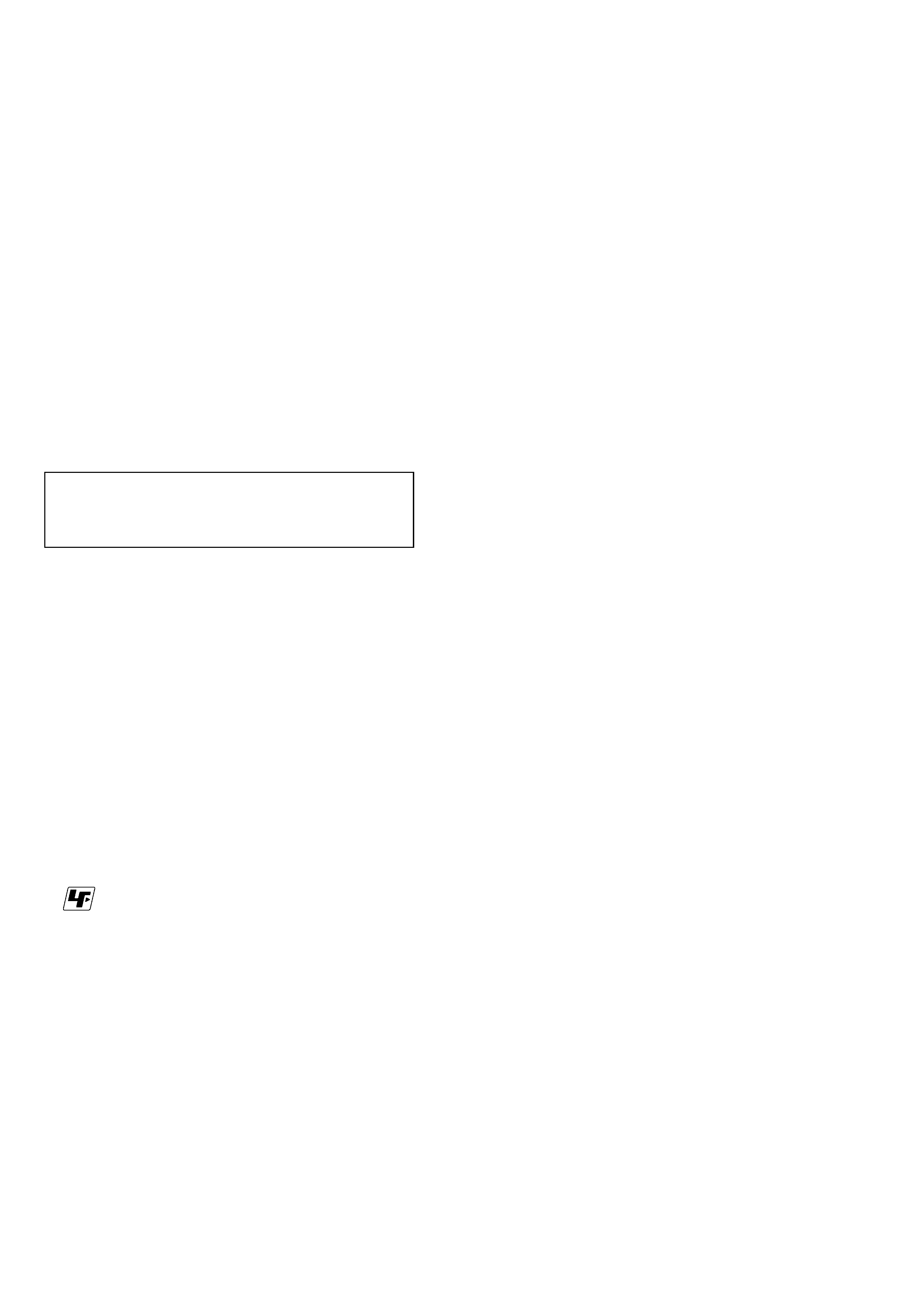
2
Specifications ............................................................................ 1
1. SERVICING NOTES ................................................... 3
2. GENERAL
Locating the Controls ......................................................... 3
3. DISASSEMBLY
3-1. Upper Lid ASSY, Cabinet (Upper) Sub ASSY ........... 4
3-2. MD ASSY, Main Board .............................................. 5
3-3. "Motor ASSY (Sled) (M902)",
Optical Pick-up (DAX-25E),
"Motor ASSY, Turn Table (Spindle) (M901)" ............ 5
4. ELECTRICAL ADJUSTMENS ............................... 6
5. DIAGRAMS
5-1. Block Diagram CD SECTION .............................. 9
5-2. Block Diagram Tuner SECTION ........................ 10
5-3. Printed Wiring Boards (FJ215 only) Side A ......... 11
Printed Wiring Boards (FJ215 only) Side B ........ 12
5-4. Printed Wiring Boards (FJ210 only) Side A ........ 13
Printed Wiring Boards (FJ210 only) Side B ........ 14
5-5. Schematic Diagram MAIN SECTION (1/4) ....... 15
5-6. Schematic Diagram MAIN SECTION (2/4) ....... 16
5-7. Schematic Diagram MAIN SECTION (3/4) ....... 17
5-8. Schematic Diagram MAIN SECTION (4/4) ....... 18
5-9. IC Pin Function Description ..................................... 22
6. EXPLODED VIEWS
6-1. Cabinet Section ......................................................... 24
6-2. Optical pick-up Section (CDM-3325ER) ................. 25
7. ELECTRICAL PARTS LIST ................................... 26
SAFETY-RELATED COMPONENT WARNING!!
COMPONENTS IDENTIFIED BY MARK 0 OR DOTTED LINE
WITH MARK 0 ON THE SCHEMATIC DIAGRAMS AND IN THE
PARTS LIST ARE CRITICAL TO SAFE OPERATION.
REPLACE THESE COMPONENTS WITH SONY PARTS WHOSE
PART NUMBERS APPEAR AS SHOWN IN THIS MANUAL OR IN
SUPPLEMENTS PUBLISHED BY SONY.
Flexible Circuit Board Repairing
· Keep the temperature of the soldering iron around 270
°C during
repairing.
· Do not touch the soldering iron on the same conductor of the
circuit board (within 3 times).
· Be careful not to apply force on the conductor when soldering or
unsoldering.
Notes on chip component replacement
· Never reuse a disconnected chip component.
· Notice that the minus side of a tantalum capacitor may be dam-
aged by heat.
TABLE OF CONTENTS
CAUTION
Use of controls or adjustments or performance of procedures other
than those specified herein may result in hazardous radiation
exposure.
DANGER
Invisible laser radiation when open and interlock failed or defeated.
Avoid direct exposure to beam.
D-FJ210/FJ215
z
UNLEADED SOLDER
Boards requiring use of unleaded solder are printed with the
lead-free mark (LF) indicating the solder contains no lead.
(Caution: Some printed circuit boards may not come printed
with the lead free mark due to their particular size.)
: LEAD FREE MARK
Unleaded solder has the following characteristics.
· Unleaded solder melts at a temperature about 40
°C higher
than ordinary solder.
Ordinary soldering irons can be used but the iron tip has to
be applied to the solder joint for a slightly longer time.
Soldering irons using a temperature regulator should be set
to about 350
°C.
Caution: The printed pattern (copper foil) may peel away if
the heated tip is applied for too long, so be careful!
· Strong viscosity
Unleaded solder is more viscous (sticky, less prone to
flow) than ordinary solder so use caution not to let solder
bridges occur such as on IC pins, etc.
· Usable with ordinary solder
It is best to use only unleaded solder but unleaded solder
may also be added to ordinary solder.
FJ-215 :
AC power adaptor (1)
Headphones/earphones with remote control (1)
Rechargeable batteries (2)
Battery carrying case (1)
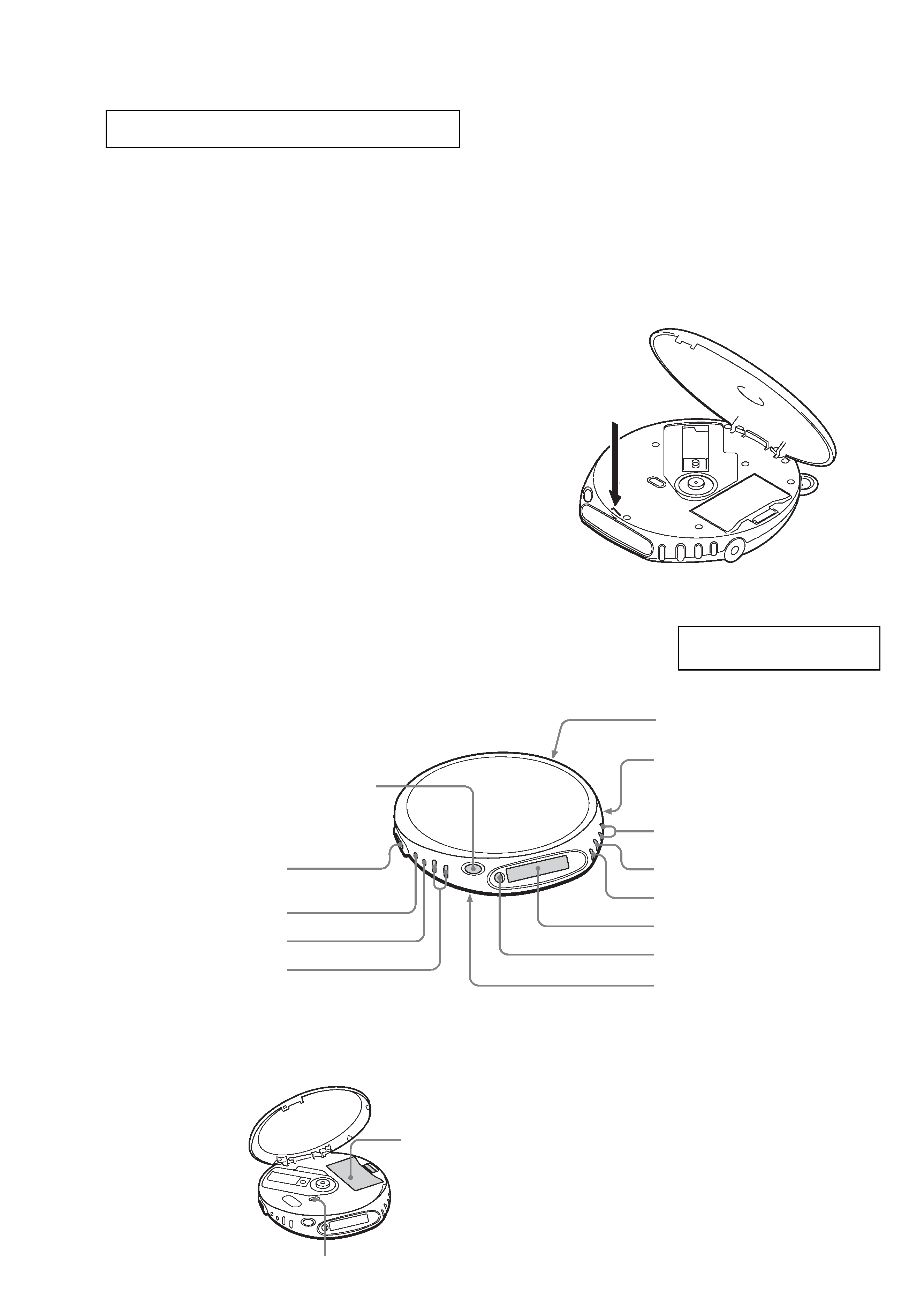
3
D-FJ210/FJ215
The laser diode in the optical pick-up block may suffer electrostatic
breakdown because of the potential difference generated by the charged
electrostatic load, etc. on clothing and the human body. During repair,
pay attention to electrostatic breakdown and also use the procedure in
the printed matter which is included in the repair parts.
The flexible board is easily damaged and should be handled with care.
NOTES ON LASER DIODE EMISSION CHECK
The laser beam on this model is concentrated so as to be focused on the
disc reflective surface by the objective lens in the optical pick-up block.
Therefore, when checking the laser diode emission, observe from more
than 30cm away from the objective lens.
Before Replacing the Optical pick-up Block
Please be sure to check thoroughly the parameters as per the "Optical
pick-up Block Checking Procedure" (Part No. : 9-960-027-11) issued
separately before replacing the optical Pick-up block.
Note and specifications required to check are given below.
· FOK output : IC601 yg pin
When checking FOK, remove the lead wire to disc motor.
· RF signal P-to-P value : 0.45 to 0.75Vp-p
SECTION 1
SERVICING NOTES
Laser Diode Checking Methods
During normal operation of the equipment, emission of the laser diode
is prohibited unless the upper panel is closed while turning ON the S809
(push switch type).
The following two checking methods for the laser diode are operable.
Method :
Emission of the laser diode is visually checked.
1. Open the upper lid.
2. Push the S809 as shown in Fig. 1 .
3. Check the object lens for confirming normal emission of the laser
diode. If not emitting, there is a trouble in the automatic power
control circuit or the optical pick-up. During normal operation, the
laser diode is turned ON about 2.5 seconds for focus searching.
NOTES ON HANDLING THE OPTICAL PICK-UP BLOCK OR
BASE UNIT
Fig.1 Method to push S809
SECTION 2
GENERAL
LOCATING THE CONTROLS
This section is extracted from
instruction manual.
S809
CD player (front)
CD player (inside)
i
(headphones) jack
OPEN
DC IN 4.5 V
(external power
Strap holes
input) jack
VOL +*/
Battery Compartment
.>
u*
x
HOLD
RADIO ON/BAND · MEMORY
*The button has a tactile dot.
Display
· RADIO OFF (D-FJ210)
x / CHG · RADIO OFF (D-FJ215)
G-PROTECTIO
P MODE/ F
SOUN/AVLS
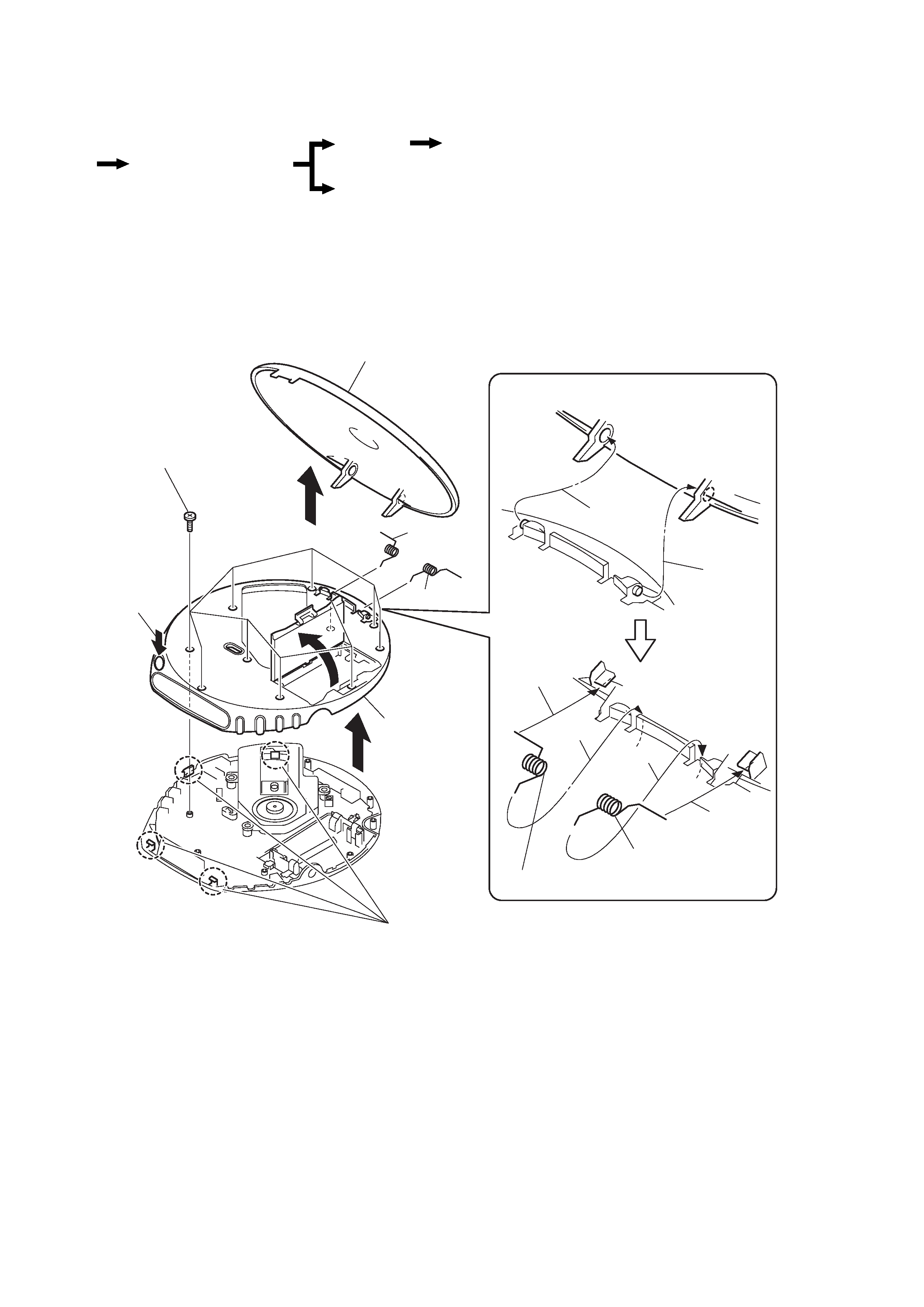
4
D-FJ210/FJ215
SECTION 3
DISASSEMBLY
Note : Follow the disassembly procedure in the numerical order given.
3-1. UPPER LID ASSY, CABINET (UPPER) SUB ASSY
z
The equipment can be removed using the following procedure.
Upper lid ASSY,
Cabinet (upper) sub ASSY
MD ASSY
"Motor ASSY (Sled) (M902)", Optical pick-up (DAX-25E),
"Motor ASSY, turn table (spindle) (M901)"
Main board
Set
5
Upper lid Assy
· CAUTION DURING ASSEMBLY
2
Spring (L)
6
Spring (L)
3
Spring (R)
3
Spring (R)
0
Cabinet
(upper) sub ASSY
1
Open
7
Ten screws (B2)
6
2
1
4
5
9
4
8
Four craws
2
1
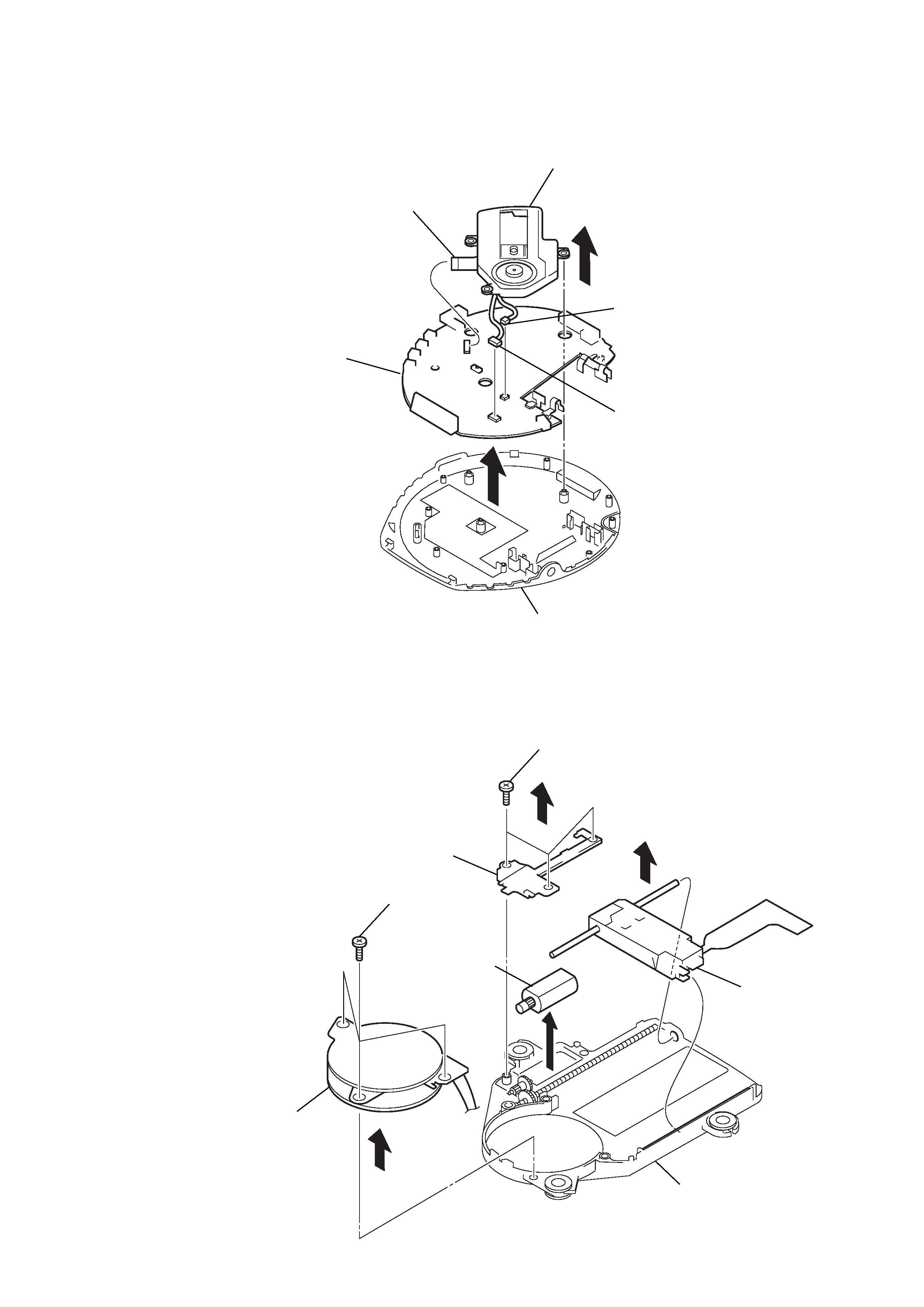
5
D-FJ210/FJ215
3-2. MD ASSY, MAIN BOARD
2
Connector (CN401)
3
Connector (CN402)
7
MAIN board
Cabinet (lower) sub ASSY
5
MD ASSY
1
CN601
4
6
3-3. "MOTOR ASSY (SLED) (M902)", OPTICAL PICK-UP (DAX-25E),
"MOTOR ASSY, TURN TABLE (SPINDLE) (M901)"
6
2
4
9
5
Motor ASSY
(Sled) (M902)
1
Three screws
(B1.7x4)
Chassis
8
Three screws
(B1.7x4)
0
Motor ASSY, Turn table
(Spindle) (M901)
7
Optical pick-up
(DAX-25E)
3
Cover, Gear
